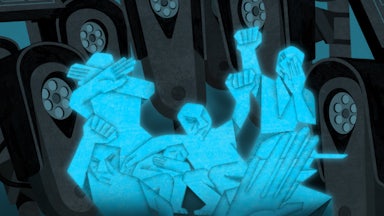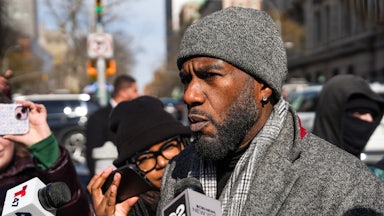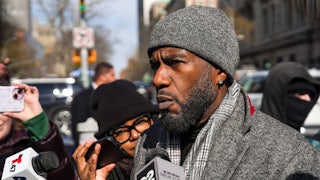Writing on Instagram shortly after his defeat in a Republican congressional primary in North Carolina, 26-year-old Representative Madison Cawthorn lashed out at the Republican establishment for turning “their guns” on him. He lavished praise on a handful of true believers—including Donald Trump, Tucker Carlson, and Marjorie Taylor Greene—before ending with a rousing call to action. “We have an enemy to defeat,” he wrote. “But we will never be able to defeat them until we defeat the cowardly and weak members of our own party. Their days are numbered. We are coming.”
In the same post, Cawthorn—not the sharpest person who has ever served in Congress—also writes that “the time for gentile [sic] politics as usual has come to an end, it’s time for the rise of the new right, it’s time for Dark MAGA.” Cawthorn undoubtedly is ready for a revolution: One of Trump’s most extreme and devoted backers in Congress, he’s a fervent election denier and conspiracy theorist. But he was mostly mad for a different reason: The GOP’s Beltway elites whupped his ass. Cawthorn may have had the most coveted talisman in electoral politics—Trump’s endorsement—but it didn’t matter: He narrowly lost to Chuck Edwards, who serves in the state legislature and owns several McDonald’s franchises. It’s a catnip storyline for the political discourse: At long last, the establishment struck back.
With the Republican presidential primary fast approaching, it’s tempting to draw larger conclusions from Cawthorn’s defeat: Perhaps, at long last, the Republican Party’s stable institutionalists (such as they are) found the willpower, if not a playbook, to take down one of its unstable populists. Moreover, Cawthorn’s district was one in which Trump’s endorsement only meant so much—at least in theory. Cawthorn came close, but Trump’s backing wasn’t enough to push him over the line. For the last seven years, disaffected figures from the Republican old guard and like-minded pundits have wrung their hands over how the party might be pulled back from the lunatic fringe and toward what they might recognize as normalcy.
Don’t get your hopes up. Cawthorn wasn’t taken down as part of some ideological course correction or a trimming of Trump-era excess. He was iced out because he had found a way to embarrass a party that’s furthering those extreme ends—no mean feat for a party that’s adopted shamelessness as its superpower.
Cawthorn’s political career has perhaps the greatest scandal-to-length ratio in American history. He was elected to Congress in 2021. He spent the three years that made up the period between the start of his congressional campaign and his defeat on Tuesday leapfrogging from one tawdry debacle to the next. He was discovered to have had a grand old time at Hitler’s vacation home, writing on Instagram that “seeing the Eagles Nest has been on my bucket list for awhile, it did not disappoint.” He participated in Trump’s January 6, 2021, “Stop the Steal” rally and later accused Democrats of being behind the ensuing riot at the Capitol. More than 150 college classmates denounced him for “predatory behavior and sexual harassment.” Several women accused him of making unwanted and inappropriate advances over a period of several years. Lewd photos of him partying with young women and a video of him sticking his penis in his cousin’s face circulated before Tuesday’s election.
He was accused of insider trading while in Congress. He was pulled over for speeding and charged with driving with a revoked license. He tried to bring a loaded gun on an airplane on not one but two occasions. He used taxpayer money to pay for dinner and hotel bills. He barely showed up to work. This, to be fair, was the fulfillment of a campaign promise: He rather famously vowed not to use his time in Congress to fix any problems or advance any legislation: “I have built my staff around comms rather than legislation,” he said in a letter to his colleagues, announcing his intention to use his seat in Congress to be a troll. What those who might herald Cawthorn’s ouster might do well to reflect upon was just how much of all that the party cheerfully tolerated.
Cawthorn’s biggest sin was simply attacking other Republicans and making life difficult for their ideological project. In March, he implied, in an interview with an obscure podcast, that other members of Congress—Republicans, presumably, since no Democrat would give him the time of day, let alone party with him—had offered him cocaine and invited him to orgies. Cawthorn was, at this point, still leading in the polls, despite the emergence of several primary challengers. But after the cocaine and orgies allegation, the race started to shift, in large part because Republicans called in the code red: attacking—and spending big—to defeat him.
It really takes a lot for Republicans to decide that you’re an embarrassment or self-evidently unfit for office. This is a party that still has a place for two members who attended a white nationalist convention. Cawthorn’s mountain of scandals grew pretty high before it finally did him in. Suffice it to say, Cawthorn wasn’t taken out because Republicans thought doing so would be good for the country but because he was too erratic and immature for even this gang of extremists—specifically, erratic and immature enough to constitute a threat.
It’s no accident that the attacks on him really stepped up after the cocaine and orgies comment—whether Cawthorn was dishing out truths or talking out of his ass, in that moment he made it clear that he’d be willing to tell tales out of school; spill the beans on what was going on behind the scenes of the Republican Party. Cawthorn could have kept up his Nazi fanboy tourism and racked up sexual misconduct allegations to his heart’s content. But announcing himself as a guy willing to break omertà was a bridge too far.
There may be one lesson for more civic-minded Republicans: Centering all of your fire on a single erratic candidate can yield results. In the 2016 presidential primary, the party failed just such a test of collective action with disastrous results. But those same civic-minded Republicans should take a lesson from what this Cawthorn episode reveals about the party: This is what happens in a cult of personality, where everyone is bucking to pass purity tests and the enemies within loom as larger dangers than those outside the tent. Cawthorn’s ouster looks a lot more like the work of a criminal organization than a political party. This isn’t a story of redemption.
Nor is it a story of turning a corner. There will be more Madison Cawthorns. Republican voters want die-hard culture warriors who don’t give an inch, even if they’re reckless and incompetent. Cawthorn ultimately proved to be reckless and incompetent in a way the GOP couldn’t tolerate, but that doesn’t mean that the larger model is being thrown out. Another Cawthorn—or perhaps several of them—will soon take his place. And as for Edwards, the establishment choice? He refused to condemn the “great replacement” conspiracy theory that fueled the mass shooting in Buffalo, New York, on Saturday, saying, “I don’t focus on rhetoric, I focus on results. I condemn open borders and the fact that we’re losing the sanctity of our nation by not enforcing immigration laws at the border.”
Ultimately, there really isn’t much more than that to learn from Cawthorn’s defeat. He lost because he was immature and screwed up and because he said his colleagues were doing drugs and having group sex. But his loss is very much the exception to the larger trends currently unfolding. Across the country, candidates backed by Trump are winning. Elected Republicans are acting more like Trump—some are even vying to be next year’s model. And the work of ensuring that the next attempt to steal the presidency will succeed where the last one failed continues apace—Madison Cawthorn just won’t be there to help get the job done.










